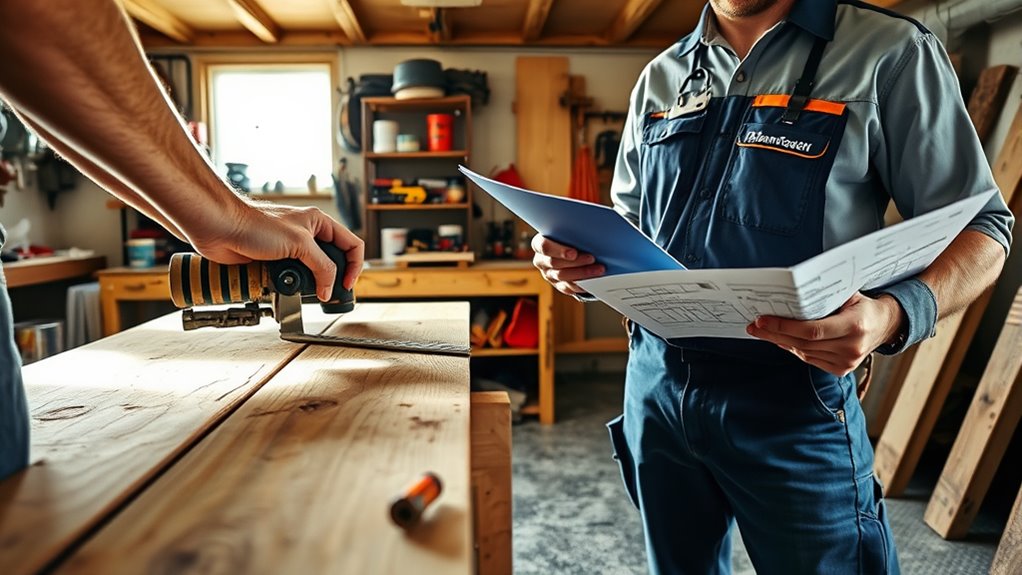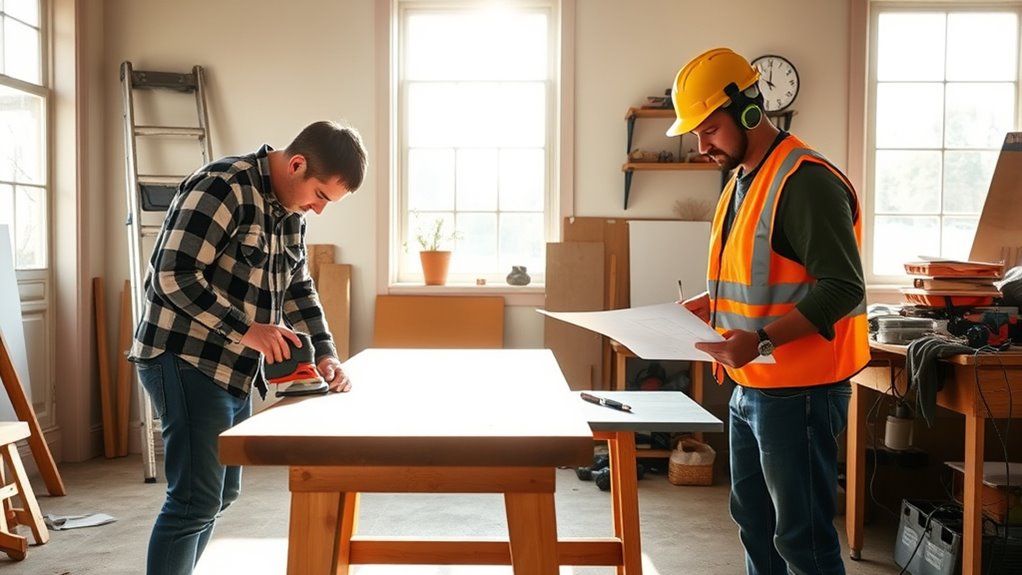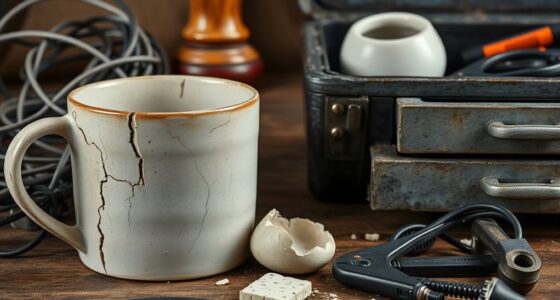Deciding whether to DIY or hire a professional depends on your skill level, project complexity, and budget. Small, simple tasks like painting or assembling furniture are usually manageable on your own. But for complex jobs like electrical work or major remodeling, it’s safer and often cheaper to bring in experts who can finish the job correctly and quickly. If you’re unsure where to start, exploring more tips can help you make the best choice.
Key Takeaways
- Assess your skill level honestly; avoid DIY for tasks involving electrical, plumbing, or structural work.
- Consider project complexity, permits, and safety requirements to determine if professional expertise is necessary.
- Compare total costs, including potential mistakes and rework, to decide if hiring pros is more economical long-term.
- Evaluate your timeline; hire professionals for faster completion and to reduce stress and project delays.
- Recognize when safety, quality, and legal compliance outweigh cost savings, indicating a need for professional assistance.

Deciding whether to tackle a project yourself or hire a professional can save you time, money, and frustration. The first step is to do a thorough cost comparison. Don’t just look at the price of supplies or materials; consider the overall expenses, including labor, tools, and potential mistakes. Sometimes, DIY projects seem cheaper upfront, but if you make errors or need to redo work, costs can quickly add up. On the other hand, hiring a pro might seem more expensive initially, but they often work more efficiently and can prevent costly mistakes. Weighing these factors helps you determine which route makes more sense financially.
Evaluate costs, skills, and project complexity to decide whether DIY or professional help makes more sense.
Next, you need to perform a skill assessment. Be honest about your abilities and experience with a specific task. If you’re comfortable using power tools, measuring accurately, and following technical instructions, you might be ready to handle some parts yourself. However, if the project involves complex electrical wiring, plumbing, or structural work, your skill level may not be sufficient, and attempting it could lead to safety hazards or code violations. Recognizing your limits is vital. Sometimes, the time and effort it takes to learn new skills or troubleshoot problems outweigh the savings, making professional help a smarter choice.
Additionally, consider the project’s scope and complexity. Small, straightforward tasks like painting a room or assembling furniture are often suitable for DIY. But for larger jobs—like installing new HVAC systems or remodeling a kitchen—you’ll likely benefit from experienced professionals. These projects may require permits, specialized equipment, and adherence to building codes, which can be overwhelming for a DIYer. If you’re unsure about the legal or safety implications, consulting a professional is wise. Moreover, understanding the importance of safety standards can help prevent accidents and ensure your project complies with regulations.
Another factor is your timeline. If you need a project completed quickly, professionals can often work faster and more efficiently because they have the expertise and resources. DIY projects, especially if you’re learning as you go, can take longer than anticipated, causing delays and extending inconvenience. Also, think about the potential stress involved. If a project is causing anxiety or taking away from your enjoyment, hiring a pro can relieve that burden and ensure the job is done right.
Ultimately, knowing when to DIY and when to hire professionals hinges on honest assessments of your skills, a clear cost comparison, and understanding the project’s complexity. By carefully weighing these factors, you can make an informed decision that saves you money and ensures the job’s done safely and effectively.
Frequently Asked Questions
How Do I Assess My Skill Level Accurately?
To assess your skill level accurately, start by honestly evaluating your past experiences with similar projects. Consider your DIY confidence—do you feel comfortable handling tools and troubleshooting issues? Be realistic about your abilities, and don’t hesitate to seek advice or tutorials. If you’re unsure, it’s better to consult a professional. Remember, a truthful skill assessment helps you decide whether to tackle the job yourself or hire an expert.
What Safety Precautions Should I Take During DIY Projects?
You should always wear protective gear like gloves, goggles, and masks to keep yourself safe during DIY projects. Be aware of potential hazards such as sharp tools, chemicals, or electrical risks, and handle them carefully. Keep your workspace organized to prevent accidents, and never rush through tasks. If something feels unsafe or beyond your skill level, stop and consider hiring a professional to avoid injury.
How Can I Estimate the True Cost of Hiring a Professional?
To estimate the true cost of hiring a professional, you should consider material costs, time commitments, and labor charges. Get detailed quotes, compare prices, and ask for itemized estimates to understand where your money goes. Think about potential extras, like permits or unforeseen issues, and factor in your time—what you could be doing instead. This way, you’ll have a clear picture of the total investment involved.
When Is It Too Risky to Attempt Repairs Myself?
You should avoid DIY repairs when the risk assessment shows potential danger, like electrical or structural issues. Evaluate your skill level honestly—if you lack experience, attempting complex tasks could cause injury or further damage. When in doubt, it’s safer to hire a professional. Prioritize safety above all, and don’t compromise by overestimating your abilities, especially with high-risk repairs that demand specialized knowledge.
How Do I Find Reputable Professionals in My Area?
You want trustworthy help, so start by checking local reviews to see what others say about nearby professionals. Don’t forget to confirm licensing requirements; they ensure quality and safety. While the convenience of hiring experts offers peace of mind, doing your research might feel overwhelming. But finding reputable professionals in your area is worth the effort, giving you confidence and peace of mind knowing your project is in good hands.
Conclusion
Sometimes, tackling a project yourself seems cost-effective, but all too often, it’s the little things that turn into big headaches. Ironically, trying to save a few bucks might end up costing you more in time, money, and frustration. So, next time you’re debating whether to DIY or hire a pro, remember: knowing when to call in the experts can actually be the smartest move — even if it feels like admitting defeat.








